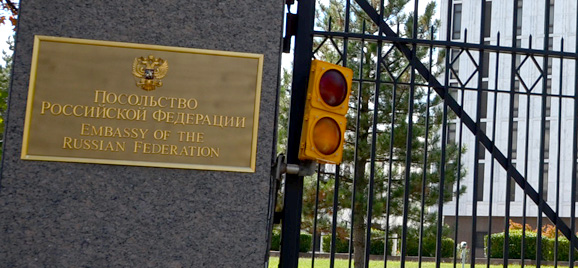Canceled U.S.-Russia Talks Place Increased Emphasis on Diplomats

Writing for Defense One, Joe Cirincione urges the U.S. and Russia to move past Snowden and focus on long-standing bilateral security threats.
In his piece, “Overcoming Snowden: New Urgency for Friday’s U.S.-Russia Meeting,” Cirincione writes:
President Obama’s decision to cancel his scheduled September summit meeting with Russian President Vladimir Putin is problematic, but predictable. The White House was furious at Putin’s decision to grant whistleblower Edward Snowden temporary asylum in Russia. But this incident, and the canceled summit, cannot be allowed to derail critical United States national security issues that require Russian cooperation.
…
The cancelation of the bilateral meeting makes the U.S.-Russian talks in Washington this Friday that much more important. The presidents may not be meeting, but their senior officials are -- and they have a chance to foster the cooperation necessary to address urgent nuclear threats confronting both nations. On Friday, Secretary of Defense Chuck Hagel and Secretary of State John Kerry will meet with their Russian counterparts Defense Minister Sergey Shoygu and Foreign Minister Sergey Lavrov.
The item at the top of their list should be resuscitating stalled reductions of the nuclear arsenals left over from the Cold War. The U.S. and Russia hold 95 percent of all nuclear weapons in the world. Both still have about 1,000 hydrogen bombs on missiles ready to launch at one another on 15-minutes notice. Most of these warheads are 10 to 50 times more powerful than the atomic bombs that obliterated Hiroshima and Nagasaki seven decades ago. A mistake or miscalculation risks catastrophe. More troubling, each nation has thousands of additional weapons in various stages of deployment or storage.
In spite of the distaste among Obama Administration officials regarding Edward Snowden’s temporary Russian asylum, Secretaries Hagel and Kerry have an opportunity tomorrow to keep the ball rolling on security reforms that benefit the safety and well-being of both the U.S. and Russia.
Cirincione’s full article is available on Defense One.
UPDATE August 9, 2013
Expanding on his piece in Defense One, Cirincione sat down with Ezra Klein on MSNBC's All In to discuss the importance of thawing the currently icy U.S.-Russia relationship in order to move forward on the nuclear weapons security agenda.



